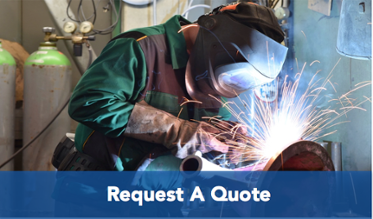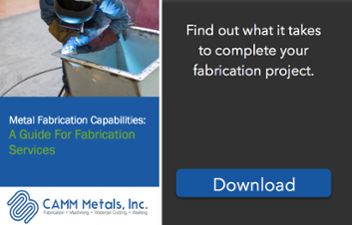Engineers are skilled and knowledgeable about their industry but that doesn’t mean they fully understand how to optimize a product or component design for metal fabrication. Working with a metal fabrication company can help engineers with the metal fabrication technology and design trends. This articles discusses tips for engineers on what they need to know about metal fabrication.
Find the Right Fabrication Company
It's vital you find a fabrication company that is willing to work with you and provide the information you need to get the best quality service. You want a fabricator who speaks your engineering design language and can integrate your thoughts into the design process. Make sure they are willing to communicate throughout the entire process so you are on the same page throughout design and production.
When you're considering a metal fabrication company's capabilities, start by evaluating the space itself-- is their facility large enough to meet your needs without the risk of problems during production? Ask about the services they offer. Consider asking these common capability oriented questions to any metal fabrication company you are considering to hire:
- What type of materials does the company predominately work with? This is a solid question to start with, as not all fabricators work with the same products. For instance, you want to ensure that the company can work with the size and thickness you prefer and you'll want a company who can handle working with your specific metal type.
- Do they offer design services? Not all metal fabrication companies offer design services. Can they work based on drawing (digital or printed)? Can they translate drawings to shop drawings? Finally, are they capable of starting from scratch without the help of an initial design?
- Inquire about the specific services they offer. Are they set up for small simple services or can they provide a host of production capabilities? Some essential capabilities include cutting and forming, welding, and metal finishing.
- Not all fabrication shops can work with the latest 3D file types. When available, using 3D files types may prevent the need to re-engineer a product and save time when it comes to programming CNC equipment. Find out if they work in 3D or only with 2D file types early.
Find the Best Price For the Best Quality
Obviously, there will be price discrepancies between fabrication companies, and sometimes this can work in your favor. It's important that you don't make assumptions based on price. For instance, one company may favor using higher quality metal or more precise cutting tools so you can expect fewer costly mistakes in the long term. Some companies cost more as they may be a smaller shop that offers customized services. While bulk purchases can be more cost effective, it might not be suitable for your specific project. Location can also negate the cost savings of a cheaper company.
Advisement On Materials
Engineering design is typically dependent on material, and there are times when switching the type of metals used can make a significant difference. This shift can change aspects in manufacturing processes, efficiency, cost, as well as your return on investment. Engineers should seek a competent fabricator who will be able to advise you on options for materials and processes that a design engineer simply might not know about. Do a little research yourself, so as an engineer you can talk materials with the fabricator and come up with the best quality materials for your budget.
Don't Micromanage Production
It’s understandable to want the best quality for your project. Although communication is key, it’s important to not hinder the project by flooding the design and process with too many details. If the fabricator can’t work with you to get through the design phase and into production, both parties are going to be annoyed and out some money.
Every product, part, or component is unique, and every detail dictates the simplicity or intricacy of fabrication. A skilled fabricator with engineering design knowledge often can suggest design fine-tunes or modifications to your designers. This gives you options and flexibility to get the quality you are looking for while also providing a faster throughput.
Make Sure Design Meets Functionality
The design might look exactly how you wanted but that’s only half of what’s needed. The other half is functionality and probably even more important component, as you don’t want the design to fold under pressure. Engineers are skilled but can often be persuaded into relying on a concept that in the end doesn’t transform into manufacturing and use. A metal fabricator who knows design can provide engineers with new innovative technology, development services such as 3D models and helpful prototypes to test practicality and manufacturability.
CAMM Metals | CT Metal Fabrication Services
At CAMM Metals, Fabrication services are the heart of what we do. From sheet metal and plate fabrication to structural members to architectural metal work and weldments, CAMM Metals has the latest technology and skilled employees to provide the quality product you are looking for.
Before any work begins, everything we do is engineered in the latest 3D CAD program which helps improve quality and reduce the amount of production time needed. From there, our team of Fabricators, CNC operators and Welders get to work. Whether it’s a small sheet metal bracket or large fabrication, 1 piece or 1,000, CAMM Metals is the place thousands of companies have trusted for over 20 years for quality fabricated metal products. We primarily work with steel, aluminum and are experts in fabricating, welding and also finishing stainless steel for both Architectural Metal Fabrication and Commercial products.





